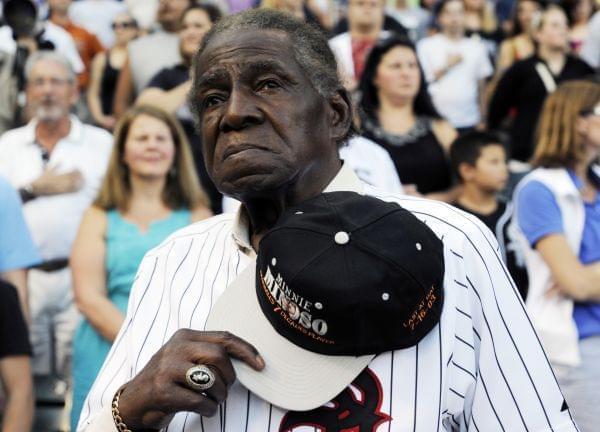White Sox Legend Minoso Dead At 90

In a Aug. 24, 2013 file photo, former Negro Leaguer and Chicago White Sox player Minnie Minoso stands during the national anthem before a baseball game between the Chicago White Sox and the Texas Rangers, in Chicago. Major league baseball's first black player in Chicago, Minnie Minoso, has died. The Cook County medical examiner confirmed his death Sunday. (AP Photo/David Banks, File)
Major league baseball's first black player in Chicago, Minnie Minoso, has died.
The Cook County medical examiner confirmed his death Sunday morning. Minoso homered in his first Chicago at-bat in 1951. There is some question about his age but the White Sox say he was 90.
According to the Chicago Tribune, Minoso was found unresponsive in the driver's seat of of a car near a gas station around 1 a.m.
Orestes “Minnie” Minoso was born in Cuba, came to the United States in 1945, and played three seasons for the New York Cubans in the Negro Leagues. He started his career with Cleveland, and was traded to the White Sox in 1951.
Minoso played 12 of his 17 seasons in Chicago, hitting .304 with 135 homers and 808 RBIs for the White Sox. The White Sox retired his No. 9 in 1983 and there is a statue of Minoso at U.S. Cellular Field.

(Pictured- Minoso was honored by the U of I's Latina/Latino Studies Department in January 2011. Photo by Jeff Bossert/WILL)
Minoso made his major league debut with Cleveland in 1949 and was dealt to Chicago in a three-team trade two years later.
He said in 2011 interview on WILL’s ‘Focus’ program how he feared being traded from Cleveland to the Sox, fully aware there were no black players in Chicago at the time.
But he said Cleveland teammate Ray Boone calmed his nerves.
“You know what he said? You’re going to be one of the great ballplayers in the league," he said. "You’re going to enjoy it. And you’re going to have many, many great years, because you have a lot of heart.”
Minoso made an immediate impact for the Sox, hitting a home run in his first at bat on May 1st of that year off Yankees pitcher Vic Raschi. He recalled that bat during the 2011 Focus program.
“It happened, I get up there, the first time, first pitch, I hit a home run," he said. "First time, first pitch off number 19 Vic Raschi. Over the bullpen – I still have the baseball. And this is where I started – and this is where I’m gonna die – with this organization, cause I love it – and the city I love it – Chicago.”
In that same game in Comiskey Park - Yankees legend Mickey Mantle also hit his first big league home run. Here's the link to the entire program, "Pioneering Latinos: Building a Legacy On and Beyond the Playing Field," which also included former Chicago Cubs prospect and poet Fernando Perez, and documentary filmmaker Bernardo Ruiz.

(Pictured: Minnie Minoso with former Chicago Cubs prospect Fernando Perez in January 2011 at the U of I's Alice Campbell Alumni Center.)
Illinois Gov. Bruce Rauner issued a statement Sunday.
"Chicago and the State of Illinois have lost a legend; Minnie Minoso was a trailblazer, a leader and an extraordinary baseball player. The 'Cuban Comet' inspired generations as the first black player for the White Sox and Chicago and one of the first Latino stars in the major leagues."
President Barack Obama, a longtime White Sox fan, issued a statement of his own.
"For South Siders and Sox fans all across the country, including me, Minnie Minoso is and will always be “Mr. White Sox.” And as he helped to integrate baseball in the 1950s, he was a target of racial slurs from fans and opponents, sometimes forced to stay in different motels from his teammates. But his speed, his power – and his resilient optimism – earned him multiple All-Star appearances and Gold Gloves in left field, and he became one of the most dominant and dynamic players of the 1950s.
Minnie may have been passed over by the Baseball Hall of Fame during his lifetime, but for me and for generations of black and Latino young people, Minnie’s quintessentially American story embodies far more than a plaque ever could. "

